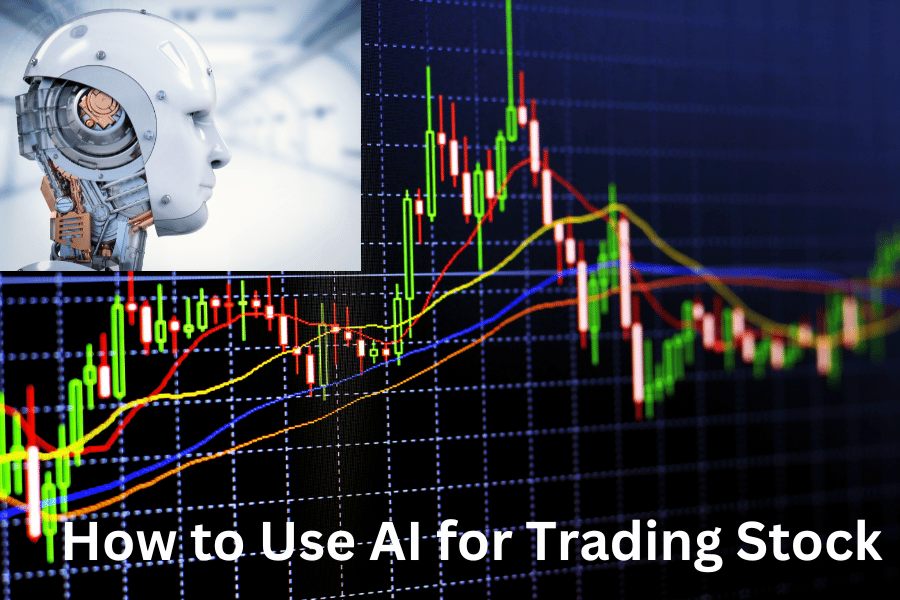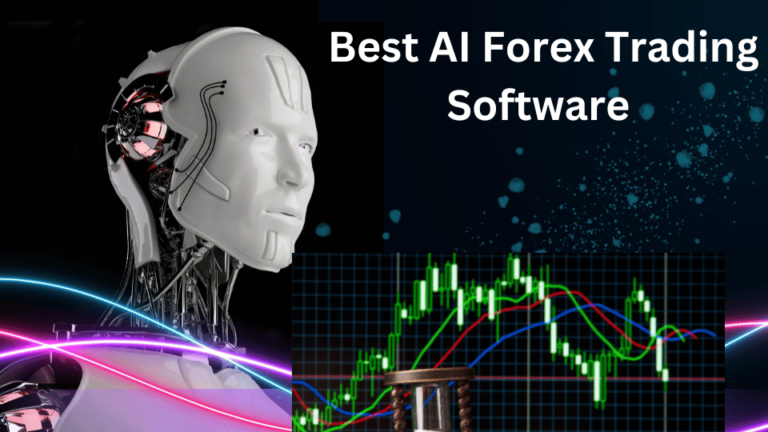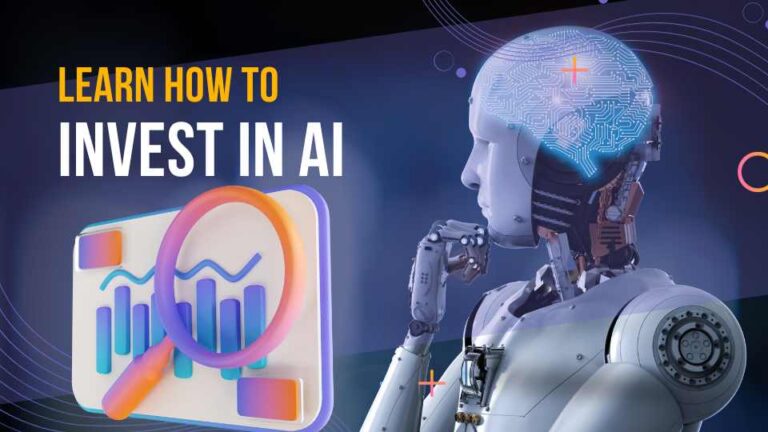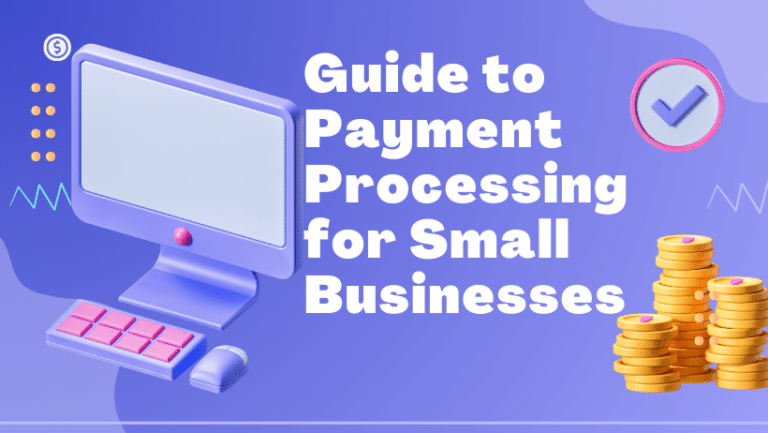In 2024, trading stocks feels like having a futuristic companion by your side – behold the power of AI. Wondering how to use AI for stock trading without feeling like you’re launching a rocket?
Well, you’re in the right place. Imagine this scenario: it’s not just about dominating the stock market; it’s about possessing a wise ally who discreetly murmurs “buy” or “sell” into your ear.
Today, I’m here to spill the beans on the not-so-secret sauce of successful trading – how to use AI for trading stocks and make it look easy. Buckle up because the future of stock trading just got much smarter.
Here are the top 10 AI software applications for stock trading:
How to Use AI for Trading Stocks
Think of AI as your seasoned guide, helping you maneuver the market’s twists and turns with finesse. In this blog post, I’m excited to spill the beans on ten ways I’ve personally integrated AI into my stock trading strategy.
Here’s how everyday investors can tap into the power of artificial intelligence to supercharge their investment portfolios.
- Harnessing the AI Brainpower: So, do you want to boost your stock trading? AI is your secret weapon. I’ve found that letting AI crunch the numbers can uncover trends and insights that my human brain might miss. It’s like having a super-smart sidekick on my trading journey.
- Smart Stock Picks, Thanks to AI Insights: Let’s talk stock picking. AI doesn’t just pick stocks; it spotlights the ones with potential. Analyzing data faster than I can say “bull market” helps me make more informed choices. It’s like having a crystal ball but without the smoke and mirrors.
- Automated Portfolio Magic: Who has time to babysit a portfolio 24/7? Not me. That’s where AI swoops in. With its automated portfolio-building prowess, I can set it and forget it (almost). It balances, diversifies, and manages my investments like a financial fairy godparent.
- Trading on Autopilot, Literally: Imagine a world where trades execute themselves. Well, with AI, that dream is a reality. It reads the market trends, executes trades, and manages the nitty-gritty details. It’s like having a personal assistant, but one that understands the stock market.
- Fine-tuning with Trade Management: AI doesn’t just trade; it manages trades like a pro. It keeps a watchful eye on market movements, adjusting my trades to optimize returns. It’s like having a virtual trading coach, but one that always stays energized and needs a coffee break.
- Optimizing Portfolios, Minimizing Headaches: Portfolio optimization sounds fancy, but it’s a breeze with AI. It takes into account risk, returns, and market conditions to fine-tune my investments. It’s like having a financial wizard whispering, “This is the optimal mix for maximum gains.”
- Data Decoded, Predictions Unleashed: Understanding market data can be a puzzle. AI turns that puzzle into a clear picture. By interpreting data and making predictions, it guides my decisions. It’s like having a market psychic, minus the crystal ball and mysterious ambiance.
- Risk Management, AI Style: Risk is the arch-nemesis of every trader. AI acts as my risk management superhero. It assesses potential risks and helps me navigate choppy market waters. It’s like having a vigilant guardian watching over my investments.
- Continuous Learning, Continuous Earning: AI doesn’t rest on its laurels. It’s in a constant state of learning and adapting. That means my trading strategies evolve with the market. It’s like having a trading companion that’s always getting smarter.
- AI Community Insights: Ever wish you had a buddy who knew what everyone in the market was thinking? AI gives me a sneak peek into market sentiment. It’s like having a backstage pass to the stock trading gossip, helping me stay ahead of the game.
So, there you have it – my top 10 ways to cozy up to AI for stock trading success. It’s like having a high-tech ally in the unpredictable world of stocks, making the journey not just profitable but downright enjoyable.
Decoding the Mechanics: How AI-Powered Stock Trading Works
In the dynamic landscape of modern finance, the integration of Artificial Intelligence (AI) has become a pivotal force, transforming how we approach stock trading. In this exploration, we delve into the intricacies of AI-powered stock trading, shedding light on the core mechanisms and sophisticated technologies that drive this financial evolution.
Understanding AI Models for Trading
At the heart of AI-powered stock trading lies a suite of advanced models designed to analyze vast datasets precisely. Machine Learning algorithms, a subset of AI, enable traders to discern patterns and trends within historical market data, providing invaluable insights for informed decision-making.
Trading Signals and AI
Trading signals, the lifeblood of strategic decision-making in the financial realm, receive a substantial upgrade with AI. By leveraging predictive analytics, AI generates signals that serve as actionable intelligence for traders. These signals anticipate market movements and offer a nuanced understanding of potential risks and opportunities.
AI Tools for Stock Trading
The toolkit for modern traders is now enriched with AI-powered tools that enhance efficiency and accuracy. Natural Language Processing (NLP) tools dissect vast volumes of financial news, social media, and reports, distilling relevant information for traders. Additionally, sentiment analysis tools gauge market sentiment, providing a comprehensive understanding of the emotional landscape surrounding financial assets.
AI Stock Trading Systems
Enterprises increasingly adopt AI-driven stock trading systems to automate and optimize their trading strategies. These systems, powered by sophisticated algorithms, execute trades with unparalleled speed and precision, minimizing human error and maximizing returns. The integration of machine learning ensures adaptive strategies that evolve with market dynamics.
AI Technologies for Trading
The technological arsenal for AI-powered stock trading is vast and ever-expanding. Here are some key AI technologies shaping the landscape:
- Machine Learning Algorithms: These algorithms process historical data to identify patterns and trends, enabling predictive modeling for future market behavior.
- Deep Learning: A subset of machine learning, deep learning utilizes neural networks to analyze vast datasets, uncovering intricate relationships and dependencies.
- Reinforcement Learning: This technology enables AI systems to learn and adapt through trial and error, refining strategies based on real-time market feedback.
Integrating AI into stock trading isn’t merely a technological novelty; it’s a strategic imperative for businesses aiming to navigate the complexities of the financial market with finesse. As we embrace the era of AI-powered stock trading, the convergence of cutting-edge technologies and financial acumen heralds a new frontier in corporate finance. The future of trading is here, and it’s intelligent, adaptive, and powered by AI.
Navigating the Pitfalls: Drawbacks of AI in Stock Trading
Artificial Intelligence (AI) continues to reshape the stock trading landscape, bringing many benefits. However, a discerning eye must also be cast on the potential drawbacks inherent in this technological evolution. In this exploration, we dissect the challenges businesses and corporations face as they integrate AI into their stock trading strategies.
Market Trends and AI
While AI excels at discerning patterns in historical data, the dynamic nature of market trends poses a challenge. Markets can swiftly shift based on unforeseen events, rendering historical data less predictive. AI’s reliance on past patterns may need to catch up to capture the nuance of rapidly evolving market dynamics.
Challenges of Algorithmic Trading with AI
Algorithmic trading, a cornerstone of AI-powered stock trading, encounters challenges related to market volatility. Sudden market fluctuations, often triggered by external factors, can disrupt pre-programmed algorithms. These challenges necessitate constant monitoring and adaptation of algorithms to ensure efficacy in diverse market conditions.
Market Data and AI Decision-Making
The quality and accuracy of market data form the bedrock of AI decision-making. Only complete or accurate data can lead AI systems astray, resulting in flawed predictions and suboptimal trading decisions. Robust data quality assurance mechanisms become imperative to mitigate this risk.
AI System Risks in Stock Trading
The complexity of AI systems introduces an array of risks. Overreliance on AI, without human oversight, can amplify the impact of errors. Additionally, the opacity of specific AI models may need to be improved to understand the rationale behind particular decisions, potentially leading to unintended consequences.
AI and Machine Learning in Trading Decisions
While machine learning enhances the adaptability of trading strategies, it also introduces the risk of overfitting. Overfit models may perform exceptionally well on historical data but need help when applied to new, unseen market conditions. Striking the right balance between model complexity and generalizability becomes a delicate task.
The integration of AI into stock trading has its challenges. Understanding and mitigating these drawbacks is crucial for businesses and corporations seeking to harness the benefits of AI while navigating the complexities of the financial market. As we venture further into the era
Harnessing the Future: How AI Can Transform the Stock Trading Industry
The advent of Artificial Intelligence (AI) has ushered in a new era for the stock trading industry, redefining the way businesses approach decision-making and market strategies. In this exploration, we delve into the transformative power of AI and how it stands poised to revolutionize the landscape of stock trading for businesses.
AI for Informed Trading Decisions
At the core of AI’s transformative impact lies its ability to empower businesses with informed trading decisions. By seamlessly integrating AI into decision-making processes, businesses can precisely navigate the intricate web of financial markets. AI analyzes vast datasets at speeds unimaginable for humans, providing real-time insights that serve as the bedrock for strategic trading decisions.
AI Trading Algorithms and Systems
The use of AI in trading extends beyond mere analysis; it encompasses the development of sophisticated algorithms and systems that automate and optimize trading strategies. Automated trading, facilitated by AI-driven algorithms, enables businesses to execute trades swiftly and efficiently, minimizing human error and maximizing returns. The result? A streamlined and agile trading process.
Market Sentiment and AI Prediction
AI doesn’t merely stop at crunching numbers; it’s attuned to market sentiment. Utilizing advanced Natural Language Processing (NLP) tools, AI scours through news, social media, and reports, distilling market sentiment to enhance predictive modeling. By understanding the emotional landscape surrounding financial assets, businesses can make predictions with a level of nuance that was once elusive.
Historical Market Analysis with AI
In the world of stock trading, historical analysis is a cornerstone. AI takes this analysis to new heights, uncovering intricate patterns and trends within historical data that might escape the human eye. The result is a comprehensive understanding of market dynamics, providing businesses with a strategic advantage in decision-making.
AI’s Role in Transforming the World of Stock Trading
The transformative potential of AI in stock trading extends beyond individual strategies; it reshapes the very fabric of the industry. From the rise of AI-powered trading bots to the integration of AI in investment strategies, the industry is undergoing a paradigm shift. AI doesn’t just automate tasks; it augments human intelligence, creating a synergy that propels the stock trading industry into a new era of efficiency and profitability.
The use of artificial intelligence is not a mere trend; it’s a strategic imperative for businesses navigating the complexities of the stock trading industry. By embracing AI, businesses can make informed trading decisions, leverage sophisticated algorithms, decode market sentiment, conduct historical analyses with unparalleled precision, and ultimately transform how they approach stock trading. As the industry evolves, AI stands as the catalyst for innovation and success, ushering in a future where businesses can thrive in the ever-changing landscape of financial markets.
Unveiling the Future: Exploring Use Cases for AI in Stock Trading
In the dynamic landscape of the financial markets, the integration of Artificial Intelligence (AI) has emerged as a transformative force, reshaping how businesses approach stock trading. In this exploration, we delve into the myriad use cases for AI in stock trading, showcasing how businesses can harness the power of AI for strategic advantage.
AI-Powered Trading Platforms
The foundation of AI’s impact on stock trading lies in the development of AI-powered trading platforms. These platforms leverage advanced algorithms to give traders real-time insights, analyzing vast datasets to uncover potential trading opportunities. The marriage of cutting-edge technology and financial understanding creates an environment where traders can confidently make informed decisions.
AI Technologies in Trading Opportunities
AI isn’t just a tool; it’s a catalyst for identifying and capitalizing on trading opportunities. By employing advanced technologies such as machine learning and deep learning, businesses can sift through complex market data to discern patterns, trends, and anomalies. This level of granular analysis empowers traders to seize opportunities that might be imperceptible through traditional methods.
AI Models for Trading Decisions
The heart of AI’s prowess in stock trading lies in its ability to develop sophisticated models for decision-making. Machine learning models process historical market data, learning and adapting to changing conditions. These models predict stock price movements and enhance decision-making processes, enabling traders to navigate the complexities of the financial markets with agility.
AI Innovations in Stock Trading Systems
The evolution of stock trading systems is marked by AI-driven innovations that transcend traditional boundaries. From automated trading strategies to intelligent portfolio management, AI innovations ensure businesses stay ahead of the curve. These systems execute trades efficiently and adapt to real-time market dynamics, providing a competitive edge in the ever-changing financial landscape.
AI Algorithms for Making Informed Decisions in Stock Trading
The role of AI algorithms in making informed decisions cannot be overstated. These algorithms process vast amounts of data, from market news to economic indicators, to generate accurate and timely insights. Traders can leverage these algorithms to refine their strategies, mitigate risks, and optimize portfolio performance.
Difference between Human Stock Trading and AI Stock Trading
In this discourse, we unravel the key distinctions, shedding light on the unique contributions each brings to the table.
Human Stock Trading: The Art of Intuition
1. Emotional Intelligence:
- Strengths: Humans bring emotional intelligence to the trading floor, leveraging intuition and experience to make nuanced decisions.
- Challenges: Emotional biases can cloud judgment, leading to impulsive decisions influenced by fear or greed.
2. Adaptability:
- Strengths: Human traders can adapt swiftly to market sentiment shifts and unexpected events, drawing on contextual knowledge.
- Challenges: Rapid adaptation may be constrained by cognitive limitations and the sheer volume of data.
3. Comprehensive Analysis:
- Strengths: Humans excel at holistic analysis, considering not only quantitative data but also qualitative factors impacting market dynamics.
- Challenges: Comprehensive analysis may be time-consuming and subject to cognitive biases.
AI Stock Trading: The Precision of Algorithms
1. Data Processing Power:
- Strengths: AI processes vast datasets at remarkable speeds, uncovering patterns and trends that may elude human analysis.
- Challenges: Over-reliance on historical data may limit adaptability to unforeseen market shifts.
2. Emotion-Free Decision-Making:
- Strengths: AI algorithms execute trades without emotional bias, adhering strictly to predefined parameters and strategies.
- Challenges: Lack of emotional context may lead to algorithmic decisions that do not align with broader market sentiments.
3. Scalability:
- Strengths: AI facilitates automated and scalable trading strategies, allowing for simultaneous analysis of multiple assets and markets.
- Challenges: The scalability may lead to a disconnect from qualitative nuances in specific market sectors.
The Synergy: Blending Human and AI Expertise
While the differences between human and AI stock trading are evident, the true power lies in their synergy. Integrating AI into trading strategies allows businesses to capitalize on the strengths of both worlds:
1. Informed Decision-Making:
- Humans provide contextual insights and intuitive understanding.
- AI offers data-driven precision and adaptability.
2. Risk Mitigation:
- Human oversight ensures alignment with overarching business goals.
- AI algorithms enhance risk management by processing vast amounts of data in real-time.
3. Continuous Learning:
- Humans evolve strategies based on experience and changing market conditions.
- AI algorithms continuously learn from data, refining strategies over time.
The difference between human and AI stock trading is not a matter of one versus the other; it’s a narrative of integration and collaboration. As businesses navigate the complexities of financial markets, harnessing the unique strengths of both human intuition and AI precision becomes the blueprint for success. The future of stock trading lies not in choosing between human or AI but in recognizing the power that emerges when the two collaborate in harmonious synergy.
In conclusion, the use cases for AI in stock trading extend far beyond automation; they represent a paradigm shift in how businesses navigate the intricacies of financial markets. From AI-powered trading platforms to innovative stock trading systems, the integration of artificial intelligence is propelling the industry into a future where informed decisions are not just a possibility but a strategic imperative.
As businesses continue to learn how artificial intelligence can enhance their trading capabilities, the synergy between AI features and stock price movements becomes the driving force for success in the modern era of stock trading and finance.
Frequently Asked Questions on AI for Stock Trading
1. Can AI trade stocks for you?
- Yes, AI can execute trades automatically based on predefined strategies and parameters. Automated trading systems utilize AI algorithms to analyze market data and execute trades without direct human intervention.
2. Is it legal to use AI for stocks?
- Yes, using AI for stock trading is legal. However, it’s crucial to adhere to financial regulations and ensure compliance with relevant trading laws.
3. Can AI trading be profitable?
- AI trading can be profitable when implemented strategically. The success depends on the quality of algorithms, data analysis, and risk management strategies.
4. Is there an AI trading bot?
- Yes, AI trading bots are software programs that use artificial intelligence to analyze market data and execute trades. These bots can operate automatically, providing a hands-free approach to stock trading.
5. What is the best AI for trading stocks?
- Determining the best AI for trading stocks depends on specific needs and preferences. Some popular AI platforms include MetaTrader, QuantConnect, and TradingView.
6. Can we use AI to predict stock price?
- Yes, AI can analyze historical data and current market trends to make predictions about future stock prices. However, it’s essential to note that stock market predictions always involve a degree of uncertainty.
7. Is making a trading bot profitable?
- The profitability of a trading bot depends on various factors, including the quality of algorithms, risk management, and market conditions. While some trading bots can be profitable, it’s crucial to approach their use with careful consideration.
8. Do AI trading bots really work?
- Yes, well-designed AI trading bots can be effective in executing trades based on predefined strategies. Their success is contingent on accurate data analysis and continuous optimization.
9. Can AI Pick Stocks?
- AI can analyze vast amounts of data to identify potential stocks based on predefined criteria. While AI can assist in stock selection, it’s essential to combine this with human insight and market knowledge.
10. The best way to build a stock trading AI?
- Building a stock trading AI involves understanding programming languages like Python, acquiring historical market data, designing algorithms, and testing the AI system rigorously. It often requires expertise in both finance and data science.
11. Should You Use AI for Your Stock Portfolio?
- The decision to use AI for your stock portfolio depends on your risk tolerance, investment goals, and comfort level with technology. AI can be a valuable tool when used judiciously, but it should complement, not replace, human oversight.







